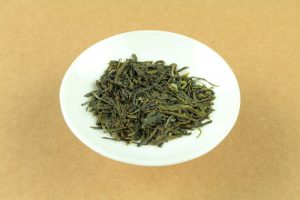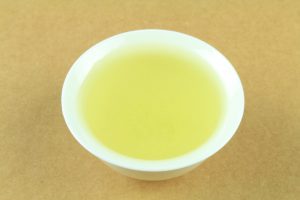This tea has a fancy name: orchid dragon (蘭龍).
The name comes from its floral aroma.
I received this sample from Ian of Yunomi.life.
The tea is made with the Shizu inzatsu 131 cultivar. It originally comes from Assam, I would consider it to be rare.
This cultivar’s most notable characteristic is its floral aroma.
Ranryū is an organic fukamushi sencha from Nearai town, Shizuoka prefecture.
I believe that the maker is Nihon Nosan. I met them at a previous World Tea Expo.
The orchid dragon
Because a lot of things happened today, I couldn’t drink any tea until now.
It’s already past dinner, but I can’t wait to drink a green tea.
This one seems very promising, since as soon as I opened the package I could tell that it is from the first harvest.
It has the familiar sweet aroma of a shincha.
The tea leaves also look good. Small and thin, with an intense green color.
I used the following parameters: 4 grams of tea, 60 ml (2 oz) of water at 80°C (176°F), for an infusion of 40 seconds.
As one would imagine, the wet leaves have a floral aroma.
To be honest, I don’t remember ever smelling an orchid, so I can’t tell you if that’s what this tea smells like.
But it’s less powerful than jasmine. Lightly sweet and fresh.
Not very marine either for a sencha.
Once poured into the cup, I can see a pale yellow color.
I find the taste to be fresh and floral, but slightly astringent. Is that why there’s a dragon in its name?
The delicate aroma contrasts with a brisk flavor.
It has some body and low sweetness as well.
I used 30 seconds for the second infusion.
Now there’s a light bitterness, it reminds me of a black tea.
I decided to lower the infusion time to 20 seconds for the third infusion.
This time there’s less overall flavor, but still some astringency.
For the last infusion I just used 10 seconds and the same temperature as before.
I liked this one better than the second and third, because it’s lighter.
The best infusion was the first one. I finally drank a good green tea today 🙂
While it has a good aroma, this tea can easily become bitter.
One way to diminish the bitterness is to use a lower temperature, but there’s a trade-off because the aroma would not be as intense.
Nevertheless it’s a rare cultivar that’s worth trying out.
Here’s the product page from Yunomi.






